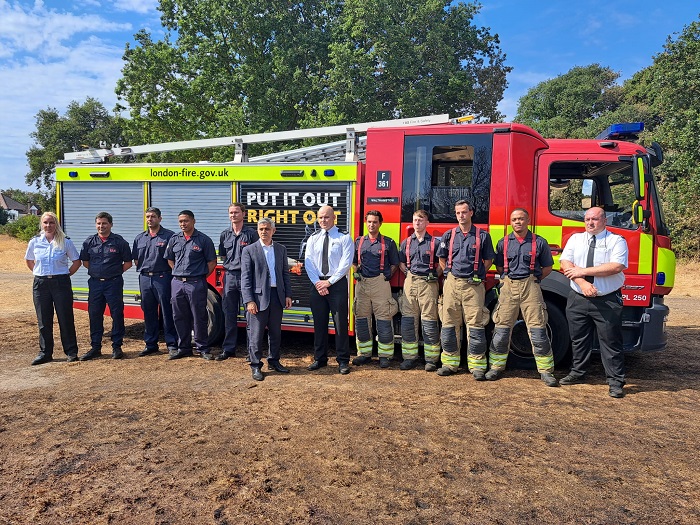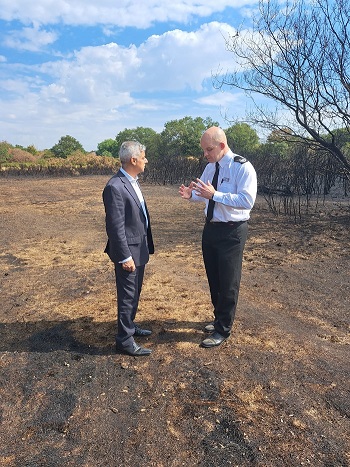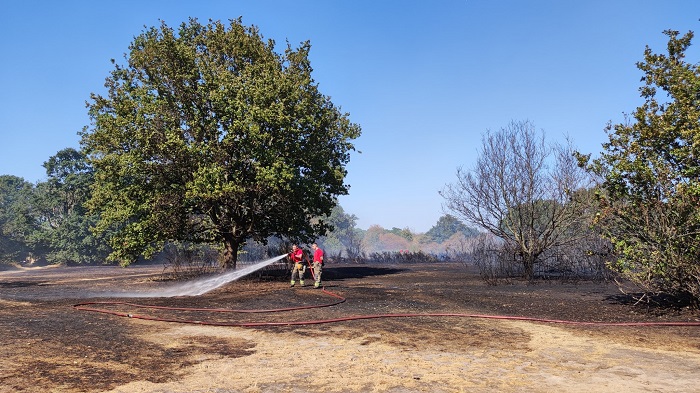London has been witnessing the impact of climate change over the last few weeks, with temperatures hitting 33 degrees at the weekend. The Mayor of London is joining firefighters in urging the public to continue to help protect the Capital and prevent further wildfires.
Last week there were two large grass fires in Leytonstone near Hollow Ponds, resulting in several hectares of grassland being destroyed. Today, the Mayor visited the scene to look at the devastation caused and to thank firefighters for their efforts in protecting the capital in such arduous conditions.

During the visit the Mayor expressed his gratitude to firefighters for their hard work, after working in extreme temperatures for several weeks now. The Brigade has seen a 128 per cent increase in grass fires this year compared with last year, stretching the Brigade’s resources to the limits. Control Officers took 3,395 calls over the weekend. The average number of calls over a weekend (Friday to Sunday) so far in 2022 is 1,853.
Even with the weather now changing, the Brigade is warning Londoners not to be complacent. The ground is still very dry and there is now a wind that could cause fires to spread more quickly. There is also a risk of flash flooding with the predicted rainfall.
Whilst the heatwave may be over, its impact is not and it is vital that Londoners are listening to safety advice, helping to prevent fires and preparing themselves for flash flooding.

Assistant Commissioner Jonathan Smith said: “Over the last few weeks it has been relentless, firefighters have been working in very challenging conditions and extreme heat. We need the public to help us during this dry, hot weather. Even if the temperatures decrease, until the grass is green there is a high risk of grass fires spreading, especially as the wind increases.
“Our resources are being stretched, but we have all the necessary processes in place to manage this. We have resources positioned across London, which are moved around based on where there is a need. We are looking for patterns in the fires – for example we are seeing more grass fires in the afternoon and in some locations more than others. We are putting extra resources in these areas so we are ready to respond.
“We need the public to act too. Don’t barbecue in open spaces or on balconies, don’t discard your litter and glass and make sure you put your cigarettes out properly. We aren’t trying to be kill joys, we are trying to protect you, your homes, your parks and open spaces and wildlife.
“Londoners also need to prepare themselves for the potential risk of flash flooding, as the ground is so dry even a small amount of rainfall could result in a flash flood.”

The Mayor of London, Sadiq Khan, said: “We are currently experiencing the driest year since 1976 and the unprecedented high temperatures mean that the grass in London is tinderbox dry. The smallest of sparks can start a large and dangerous fire which could cause significant damage to our green spaces, homes and businesses and put lives at risk.
“That’s why it’s so important amid the ongoing heatwave and drought that we all play our part in preventing further fires and reducing the pressure on our emergency services.
“That means disposing of your litter – particularly glass – responsibly, putting out cigarettes properly, not using disposable barbecues and avoiding barbecues in open spaces or on balconies. We also need to stay away from the dangers of deep water in our canals, rivers and reservoirs, which can be deadly – even for strong swimmers.
“Even though we have a drought warning in place, we are expecting rain this week. The ground is rock hard and can't absorb rain as usual. This means the rain won't fix the drought conditions and, if the downpour is heavy, there is a risk of flash flooding across London as water pools on the surface or overwhelms the drains.
“From City Hall, we’ve written to tens of thousands of households living in basements to raise awareness of the risks of flash flooding and steps to take to be prepared. Londoners should check their local council's website for more information on action to take in case of a flood.”
Ways you can help prevent grass fires:
Flash flooding advice: